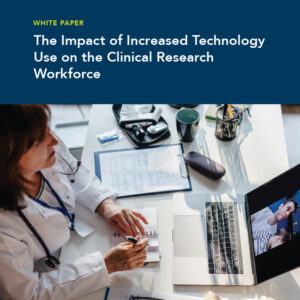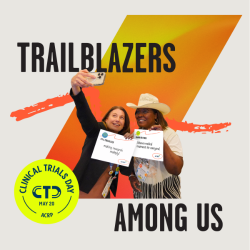Increasing use of technology and broader adoption of decentralized clinical trials (DCTs) will require an unprecedented transformation of the clinical research workforce.
That’s the conclusion of a new white paper published today by the Association of Clinical Research Professionals (ACRP) that highlights the emergence of several new professional roles, as well as anticipated change in traditional roles on the clinical research team.
“Spurred in part by the ongoing COVID-19 pandemic, DCTs are bringing more technology to clinical research and along with it the promise of greater efficiency, productivity, and effectiveness,” says Jim Kremidas, ACRP’s Executive Director. “But to fully realize that potential, roles will need to evolve and operate differently to accommodate this new environment. With today’s white paper, we want to make sure ACRP members and others in the field can adapt and develop new competencies to prepare for the future.”
The Impact of Increased Technology Use on the Clinical Research Workforce, available free on ACRP’s website, highlights recent trends in technology use in clinical trials; definitions of fully decentralized and “hybrid” trials; technology impacts on traditional workforce roles; and potential new roles likely to emerge.
Major conclusions include:
- The majority of clinical trials that implement decentralization, at least in the short term, will be hybrid trials, and aspects of decentralization (e.g. virtual visits) will be leveraged more often and receive more overall acceptance by industry due to COVID-19.
- Increased use of technology will impact nearly every role. But rather than being a threat to job roles, it will generate the need for the evolution of existing roles and bring unprecedented flexibility and efficiency. For instance, in hybrid trials clinical research coordinators could potentially work from home one or more days per week when their patient interactions are virtual.
- New roles likely to emerge include Tech Trainer for CROs, Site Tech Support, Remote Trial Coordinator, Decentralized Investigator, Virtual Patient Guide, and more.
- Technology training must be standard practice and written into each site manual and delegation log.
The white paper was developed by a multi-stakeholder working group including representation from technology suppliers, contract research organizations, sites, and more.
The working group emphasizes the need for continued collaboration among stakeholders to improve clinical research, improve patient recruitment and retention by increasing convenience for patients, and introduce direct information streams to improve data quality.
“These changes will lead to shorter times to market for important medicines,” the group concludes. “However, it will require patience and understanding to navigate our way through this transformational change. All of the key stakeholders—sponsors, CROs, and sites – will need to collaborate closely to achieve these important goals.”
In response to the working group’s findings, ACRP Partners in Workforce Advancement (PWA) is planning updates to existing competency guidelines to reflect inclusion of the tech-based competencies. The PWA is also beginning work to define and gain stakeholder alignment on competency guidelines for emerging roles.
Organizations who want to support ACRP’s workforce development initiatives are encouraged to join the PWA. The PWA is a multi-stakeholder collaborative initiative to grow and expand the diversity of the clinical research workforce, and to set and support standards for workforce competence. Learn more at acrpnet.org/pwa.



